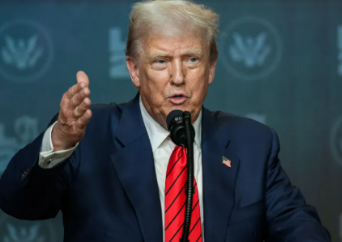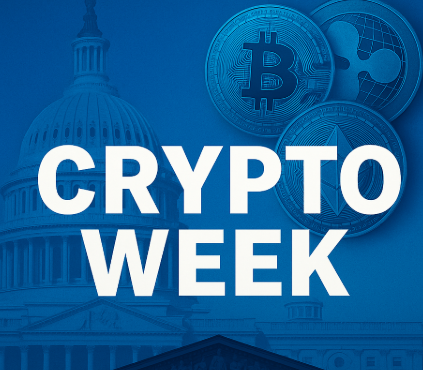Trump embraces Bitcoin, but swing-district Republicans downplay crypto due to potential alienation of suburban moderates, despite exciting their base.
What to Know:
- Pew data shows 60% of Americans lack confidence in crypto, with distrust highest among older voters and suburban moderates.
- Scandals like FTX and Sam Bankman-Fried continue to shape public perception, making crypto a risky talking point in swing districts.
- In battleground suburbs, voters are more focused on inflation, education, and public safety than on blockchain innovation.
- Confidence in crypto drops sharply among working-class and less educated voters, complicating GOP outreach to blue-collar constituencies.
- Democrats are already testing anti-crypto messaging that frames it as unstable, unregulated, and tied to MAGA corruption.
While Donald Trump champions a pro-crypto stance nationally, embracing Bitcoin mining and rejecting CBDCs to appeal to his libertarian base, Republican candidates in swing districts are discreetly stepping away from the unpredictable realm of cryptocurrency. Why? Because in suburban battlegrounds where trust and economic stability rule the day, crypto doesn’t look like innovation. It looks like a liability.
A Fractured Message for a Fragmented Audience
A recent Pew Research Center report found that three in five Americans (60%) say they are not confident in the safety and reliability of cryptocurrencies. A striking generational reality check for a technology once assumed to be youth-driven: 68% of those over 50 and 43% of those under 30 are included in that figure.
Data from Pew Research Center report
In swing districts where winning means threading the needle between the MAGA base and suburban moderates, this data has landed with a thud. Do candidates risk alienating moderate parents concerned about financial crashes like FTX by championing cryptocurrency, or does it energize younger conservatives?
Crypto Scandals Still Cast a Long Shadow
Despite the industry’s attempts to pivot post-FTX, most voters haven’t forgotten the name Sam Bankman-Fried. Cryptocurrencies are increasingly viewed unfavorably by the American public. According to Pew data from October 2023, nearly half of Americans (45%) have a negative impression of cryptocurrencies, a notable increase in recent years. In contrast, only 17% hold a positive view.
Data from Pew Research Center report
Republicans, especially those running in competitive suburban districts in Pennsylvania, Wisconsin, Arizona, and Georgia, are caught in a messaging trap. While national figures like Trump and Vivek Ramaswamy may champion blockchain as a tool for freedom, local voters remain mindful of the fraud, bankruptcies, and billions lost.
Suburban voters, particularly women aged 35-64, are far more likely to describe crypto as “risky,” “confusing,” or “a scam.” GOP strategists in these districts are advising candidates to prioritize issues like inflation, safety, and education, rather than focusing on speculative tokens and blockchain terminology.
Education and Income Gaps
Pew’s data also reveals another uncomfortable truth: crypto divides not just by age and ideology, but also by education. While 27% of Americans with a postgraduate degree say they’re confident in crypto’s safety, that figure plummets among those with less formal education. Among high school grads, only 8% express confidence.
Data from Pew Research Center report
This poses a problem for populist Republicans hoping to energize blue-collar voters. Crypto, at its core, remains deeply abstract. It’s not something you can put in a 401(k) or explain at a school board meeting. It’s speculative capital in an economy where many voters are still struggling to afford groceries.
Worse still, some in the Republican coalition fear that the party’s increasing embrace of crypto plays into Democratic attacks that the GOP is in bed with unregulated financial actors. After FTX, that message is resonating more than it used to.
The Trump Factor
Trump, to be clear, is not backing down. His campaign has embraced crypto donations, promised to support Bitcoin mining, and even suggested appointing pro-crypto regulators. This demographic, increasingly vital to his online presence, is a key target for his impactful messaging.
Screenshot taken from President Donald Trump’s Campaign Website
But suburban GOP candidates know that these same voters often don’t show up in off-year or midterm cycles. In places like Colorado’s 8th District or Pennsylvania’s Lehigh Valley, Republicans can’t afford to spook older homeowners or financially cautious swing voters with what they view as another Wall Street gamble.
What’s the Strategy Moving Forward?
Some Republicans are attempting a pivot: distancing themselves from “crypto” while embracing “financial innovation.” Others are avoiding the subject entirely, hoping it fades into the noise. But the tension is real. If the GOP is serious about building a durable, multi-generational coalition that includes suburban moderates and younger tech-savvy voters, they’ll need to reconcile Trump’s national crypto cheerleading with the skepticism simmering in key House districts.
Democrats are already taking notice. A handful of DCCC-aligned groups are testing anti-crypto messaging in battleground polling. They’re tying crypto to financial instability, deregulation, and MAGA corruption. And if Republicans aren’t careful, it could stick.
Wrap Up
The political future of crypto remains uncertain. It may appeal to younger voters frustrated with traditional finance, but in swing districts, it is more risk than reward. For Republicans trying to hold or flip House seats in 2026, crypto does not help. It hurts.
Voters in key battlegrounds are not asking about Bitcoin. They are focused on prices, schools, safety, and stability. To them, crypto still feels like a gamble. And right now, the GOP cannot afford to look reckless. Winning these districts takes discipline. It means speaking to everyday concerns, not online trends. Until public trust in crypto improves, the path to a Republican House runs through voters who still believe in dollars, not digital tokens.

.png)



